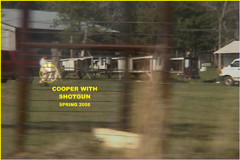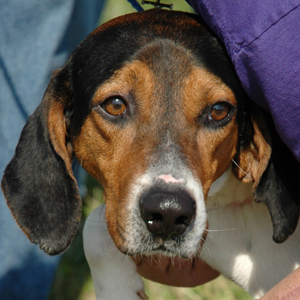Class B Dealer Cooper
A Veterinary School Student Goes Undercover for LCA
 Henry Lee CooperHenry Lee Cooper ran C&C Kennels in Wewoka, Oklahoma. He sold live cats, dogs and rabbits to several institutions for research, including Oklahoma State University (OSU) Laboratory Animal Resources Unit. From 2005-2007 OSU purchased 459 live dogs from C&C Kennels. The University of Oklahoma (U of O) Health Sciences Center in Oklahoma City concurrently bought 7 live dogs from C&C Kennels for use in education. Institutional Animal Care and Use Committee protocols show that a doctor at U of O Health Sciences Center used 85 live dogs (over a three-year period) purchased from C&C Kennels to teach physicians how to place and remove heart catheters. The dogs were anesthetized before the training session and euthanized at the end. U of O also purchased live kittens in 2006 and 2007. Invoices indicated that kittens were purchased for $100 each, and dogs were each purchased for $150-$200. Altogether Cooper sold 2,395 animals from 2004-2006, earning $280,000.
Henry Lee CooperHenry Lee Cooper ran C&C Kennels in Wewoka, Oklahoma. He sold live cats, dogs and rabbits to several institutions for research, including Oklahoma State University (OSU) Laboratory Animal Resources Unit. From 2005-2007 OSU purchased 459 live dogs from C&C Kennels. The University of Oklahoma (U of O) Health Sciences Center in Oklahoma City concurrently bought 7 live dogs from C&C Kennels for use in education. Institutional Animal Care and Use Committee protocols show that a doctor at U of O Health Sciences Center used 85 live dogs (over a three-year period) purchased from C&C Kennels to teach physicians how to place and remove heart catheters. The dogs were anesthetized before the training session and euthanized at the end. U of O also purchased live kittens in 2006 and 2007. Invoices indicated that kittens were purchased for $100 each, and dogs were each purchased for $150-$200. Altogether Cooper sold 2,395 animals from 2004-2006, earning $280,000.  Undercover photo of Cooper with a gunOn August 27, 2007 the USDA filed an official complaint against Cooper regarding the following Animal Welfare Act violations:
Undercover photo of Cooper with a gunOn August 27, 2007 the USDA filed an official complaint against Cooper regarding the following Animal Welfare Act violations:
• dogs in danger of injury from structurally-unsound cages
• inadequate pest prevention/control
• rabbits kept in filthy cages
• overcrowding of rabbit cages
• dirty water containers
• failure to maintain an adequate veterinary care program
• dogs in apparent need of veterinary care (e.g., bloody diarrhea)
• keeping of unidentified animals
• animals acquired from unidentified sources
• excess animal waste in cages
• dogs kept without access to shelter
• creation of false acquisition records
Investigation
In October of 2007, a third-year veterinary student at OSU, Kim (not her real name) watched HBO’s “Dealing Dogs” documentary in which LCA sent an undercover operative into the world of B-Dealers. When she asked about the dogs used in her program and learned they originated from B-Dealers she immediately called LCA.
After an extensive investigation, LCA’s Special Investigation Unit (SIU) ascertained that a B-Dealer named Henry Cooper, also located in Oklahoma, was the main supplier of dogs to the school. Surveying Cooper’s property, the SIU found several kennels of dogs waiting to be sold into research and the skeletal remains of dogs that had died there.
LCA's Lucky 11
 Winston, one of the Lucky 11Several months into the investigation, Kim saw a group of male dogs come in from a Class B dealer. Having witnessed the suffering and death of so many other dogs, she was determined to save this group. She began negotiations with the facility to release the dogs for adoption, while being careful not to blow her cover as an animal rights activist. The facility had never even considered such a thing in the past. Their dogs were euthanized or sold if they were deemed of no further “value.” The administrators could not understand why anyone would want to adopt these dogs.
Winston, one of the Lucky 11Several months into the investigation, Kim saw a group of male dogs come in from a Class B dealer. Having witnessed the suffering and death of so many other dogs, she was determined to save this group. She began negotiations with the facility to release the dogs for adoption, while being careful not to blow her cover as an animal rights activist. The facility had never even considered such a thing in the past. Their dogs were euthanized or sold if they were deemed of no further “value.” The administrators could not understand why anyone would want to adopt these dogs.
Surprisingly, the facility agreed to release the dogs the following weekend. However, the administration would only release the dogs if no other research facility wanted them. The administration advertised they had Class B random source dogs available for purchase and if no one wanted them, then they would be released.
On Friday afternoon, still uncertain but hopeful, LCA’s unmarked vans arrived to meet Kim in a parking lot near the research facility. Moments after the rescue vans pulled up, Kim’s cell phone rang. The news was good; the facility agreed to release the dogs. Soon, with the help of Kim’s family and friends, the dogs began arriving at the parking lot, one at a time, and then two and three at a time.  Omega, one of the Lucky 11Each was malnourished, backbones and rib cages apparent with their backs shaved, some with more hair grown in than others, and 8 identical scars. All of the dogs had ear mites, were malnourished and had various other ailments. Many of the dogs had “kennel legs,” a condition that stems from living in a kennel and not learning how to walk in open spaces. These dogs had trouble walking and did not trust the ground they were standing on. A few other dogs had “fear of the outside” – cowering from the very air they were breathing. All the dogs had behavioral issues from a lifetime in and out of research and Class B dealer facilities.
Omega, one of the Lucky 11Each was malnourished, backbones and rib cages apparent with their backs shaved, some with more hair grown in than others, and 8 identical scars. All of the dogs had ear mites, were malnourished and had various other ailments. Many of the dogs had “kennel legs,” a condition that stems from living in a kennel and not learning how to walk in open spaces. These dogs had trouble walking and did not trust the ground they were standing on. A few other dogs had “fear of the outside” – cowering from the very air they were breathing. All the dogs had behavioral issues from a lifetime in and out of research and Class B dealer facilities.
Click here for more on LCA’s Lucky 11.
Outcome
On August 26, 2008, Cooper’s license to acquire dogs was suspended for five years starting on May 19, 2009. OSU, however, continued to acquire live animals for its veterinary school. At this time, Kim contacted Madeline Pickens, the wife of billionaire and OSU graduate T. Boone Pickens, who had donated $5 million to the veterinary school. After this conversation, Ms. Pickens was deeply concerned about what she called “cruel and inhumane” practices at the veterinary school and ordered the Dean of the school to use her donation in some other way.
![]() Learn more about: Class B Dealer CC Baird
Learn more about: Class B Dealer CC Baird